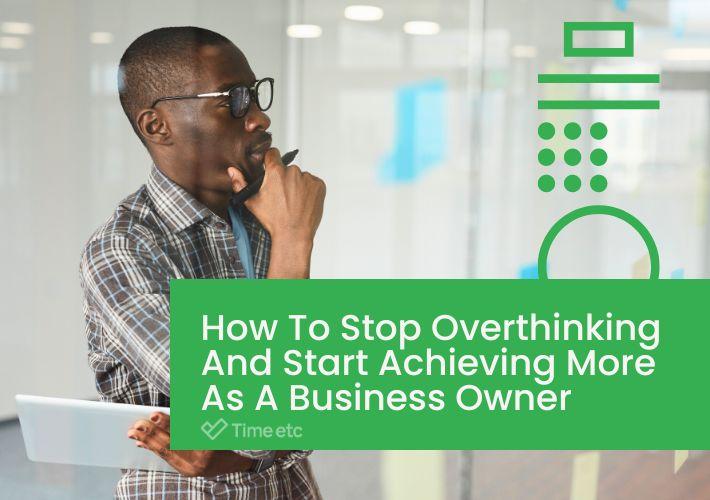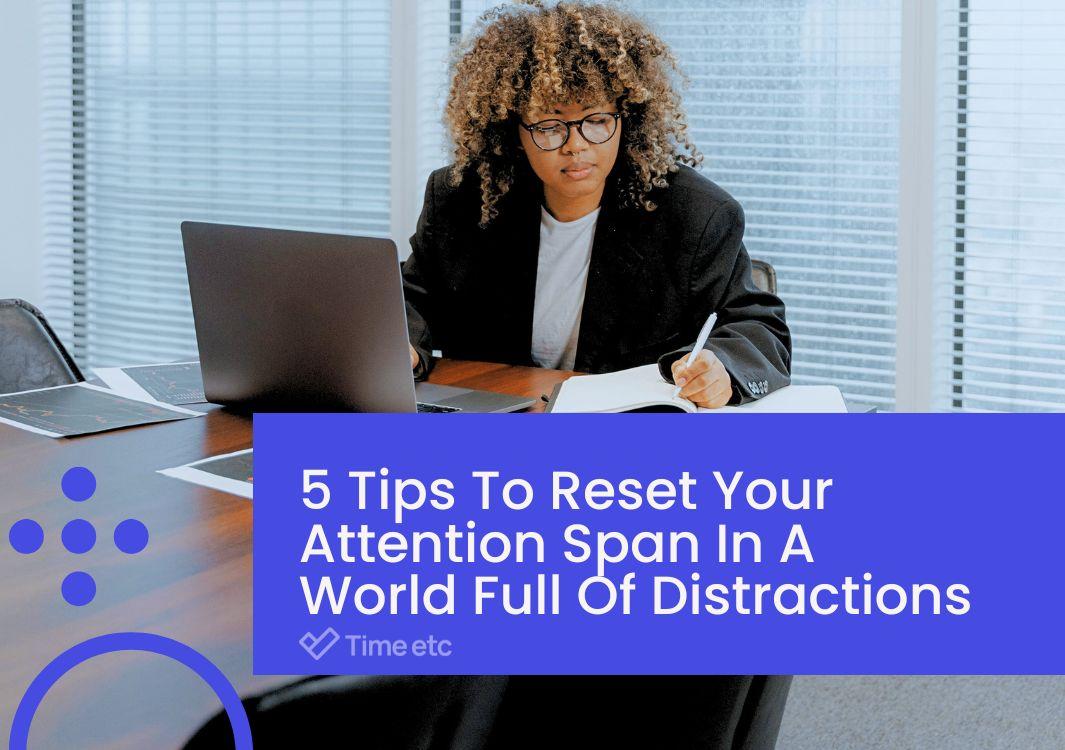As a business owner, your mind is your greatest asset. It's the driving force behind every decision, every strategy, and every action you take to build and grow your business. However, sometimes that very same mind can create your greatest obstacles, leading you down a rabbit hole of overthinking and analysis paralysis.
If you're reading this, chances are you've experienced the crushing grip of overthinking firsthand. Perhaps you've spent hours agonizing over minor details, procrastinating on crucial tasks, or losing sleep over hypothetical scenarios.
The truth is that overthinking not only drains your mental energy but also sabotages your ability to achieve your goals and realize your full potential as a business owner.
Here, we’ll explore why we overthink and how it can impact our business. From there, we’ll share some valuable strategies that you can use to combat the perils of overthinking and help your business flourish and grow.
Why do we overthink?
Overthinking affects people of every age and background, but as business owners, we are particularly susceptible to this issue.
Why is this?
Fear of failure
Running your own business can often feel like walking a tightrope, with the fear of failure looming over every step. When the stakes are so high, every decision, every action, and every moment seems to hold enormous weight.
Whether it's the time, effort, and passion poured into a particular project or the burden of responsibility towards investors, employees, and even loved ones, the fear of making a wrong move can be paralyzing.
Perfectionism
While striving for excellence is admirable, the constant pursuit of perfection can lead to unrealistic standards—overanalyzing every tiny aspect and dwelling on every minor mistake, always seeking that unattainable ideal.
When you've built your own business from the ground up, it's understandable to want everything to be just right. But the truth is that perfection is highly subjective and often elusive.
It's like chasing a mirage in the desert. No matter what you do to try and reach the shimmering oasis, it never materializes, leaving you exhausted and dissatisfied.
See: The 3 Ps That Stop Entrepreneurs From Achieving More
Imposter syndrome
Some studies suggest as much as 80% of people suffer from some form of workplace imposter syndrome.
It's that nagging feeling of not being good enough, despite clear evidence of success. When this feeling creeps in, overthinking often follows closely behind.
Picture this: you've just closed a big deal or received praise for your work, but instead of celebrating, you start dissecting every little detail, questioning if you truly deserve it, and worrying that you'll be exposed as a fraud.
This constant doubt can make it hard to trust your instincts and make confident decisions as a leader.
See: 6 Steps To Get Back On Track After A Mental Block

Choice paralysis
Most business owners these days are overwhelmed with data. With so many sources of information, it can be difficult to separate the signal from the noise.
Choice paralysis—also known as choice overload—occurs when the abundance of options or information overwhelms decision-making. Simply put, the more options we have in front of us, the harder it becomes to choose one.
For example, imagine you're planning new products to develop, or you need to replace your team's outdated software with a modern solution. Have you ever found yourself stuck in a rabbit hole of research, weighing every option, and analyzing every detail because you're afraid of making the wrong choice? That's choice paralysis in action.
Whether it's hesitancy or procrastination, this can hold you back from taking the decisive action that's needed to make meaningful progress.
See: Why Complexity Is Killing Your Chances Of Success In Business
Control
As an entrepreneur, wanting to stay in control is a natural instinct, especially for an estimated 50% of us who started our own companies to be our own boss. However, this desire for control can be a double-edged sword.
On one hand, being in control allows us to make decisions and steer our business in the direction we want. It gives us a sense of autonomy and ownership. But when we've invested so much of ourselves into building our ventures from the ground up, it's easy to become overly cautious and risk-averse. We want to protect what we've built at all costs.
Every risk looms larger than life, and we end up sinking excessive time and energy into scrutinizing any change that could potentially upset the status quo. This can prevent us from taking calculated risks and exploring new opportunities.
The psychology and science behind overthinking
So, what actually happens in our bodies and minds when we're overthinking?
Let’s start by looking at the brain chemicals involved:
- Dopamine is a type of neurotransmitter that is strongly associated with pleasure and reward, contributing towards feelings of alertness, focus, motivation, and happiness.
- Serotonin is a neurotransmitter that is sometimes referred to as "the happy chemical" for the role it plays in mood regulation, as well as sleep and digestion.
- Adrenaline is a hormone released by the adrenal glands in response to a stressful, exciting, dangerous, or threatening situation, preparing the body for the "fight-or-flight" response.
- Cortisol is a steroid hormone released by the adrenal glands that is often called "the stress hormone" because of the key part it plays in the body's response to stressful or scary situations.
According to experts, dopamine rewards problem-solving by triggering feelings of pleasure and satisfaction in the brain. It serves as a powerful motivation that reinforces behaviors associated with successful problem-solving.
When we attempt to solve problems, adrenaline levels increase, heightening alertness and focus and preparing the body for action.
Serotonin is activated as potential solutions to problems arise, boosting feelings of well-being, confidence, and optimism as we navigate through various options.
However, if the problem goes unresolved, serotonin activity may be blocked, leading to a decrease in mood and motivation. Not only that, the stress hormone cortisol is released by the adrenal glands, impairing cognitive function and triggering a cascade of physiological responses, making it more challenging to find solutions and creating a vicious circle of stress and anxiety.
See: 6 Stress Management Techniques From The World’s Most Successful Business Leaders

How does overthinking impact our business?
As shown above, overthinking can have a serious impact on business owners' moods, but it doesn't stop there. It can also affect their businesses in various ways.
Let's take a closer look at the impact.
Delayed decision-making
As an entrepreneur, you'll know that running a business is full of decisions—both big and small. While careful consideration is crucial for effective decision-making, the fear of making the wrong choice can sometimes do more to hinder your business than to help it.
The world of business is more competitive than ever, and yours needs to be agile enough to react and respond to changes when needed. If you move too slowly, projects can run late, opportunities may pass by while you're stuck deliberating, and, in the worst-case scenario, erode your competitive advantage.
Not only that, but the constant analysis and scrutiny of every detail can create a distorted view of a situation, making it tougher to discern the most suitable course of action. This mental overload not only consumes valuable time and energy but also increases stress levels, further impairing the rational thinking needed to make sound choices.
Poor problem-solving
It goes without saying that your ability to solve problems directly impacts the success and sustainability of your venture. Whether it's resolving customer complaints, overcoming operational obstacles, or navigating industry uncertainties, strong problem-solving skills make it possible for you to adapt, innovate, and thrive in an ever-changing landscape.
You may think that by overthinking, you're being diligent in ensuring the best possible outcome, but such a habit can actually sabotage your efforts.
During her lifetime, psychology professor Susan Nolen-Hoeksema was one of the leading experts on overthinking, publishing many research studies and several books on the topic. According to the results from her multi-year research program, Nolen-Hoeksema found that chronic overthinkers generate poor solutions to their problems. Not only that, but they feel unable to implement any of their solutions.
Missed opportunities
Facebook founder and CEO Mark Zuckerberg once said, “The biggest risk is not taking any risk... In a world that's changing really quickly, the only strategy that is guaranteed to fail is not taking risks."
As we mentioned earlier, overthinking can lead to analysis paralysis. If you spend too much time reevaluating your decisions to make sure they are correct, you can miss out on golden opportunities to push your business forward, such as profitable trends, marketing openings, or even strategic partnerships.

Reduced productivity
If you get too bogged down in endless what-ifs and uncertainties, it can really slow you down. Spending too much time analyzing everything drains your energy and focus, making it harder to pay attention to details and get things done quickly.
Remember, there are only so many hours in a day. If you spend too much of your limited resources weighing up every possible scenario, it’s coming out of your productivity budget. It’s that simple.
Burnout
As we discovered earlier, overthinking often triggers our stress response. If we're prone to overanalyzing situations and obsessing over potential outcomes, this constant mental strain can exhaust our cognitive resources and drain our energy reserves. Then before long, we're burnt out.
Operating in a state of burnout can wreak havoc on our work, as your motivation, focus, and productivity plummet. But it doesn't stop there.
As burnout follows a state of chronic stress, experts believe that the prolonged impact of stress on the body can compromise physical health, making individuals more vulnerable to illnesses like the common cold and even increasing the likelihood of developing serious conditions such as cardiovascular disease. Not only that, those grappling with burnout are also more prone to experiencing mental health challenges like anxiety and depression.
Let's be honest, any of these issues will hurt your ability to perform at your best. Running a business is tough enough as it is, let alone if you’re sick.
Five strategies to stop overthinking
OK, now you understand the mechanics of overthinking, here are some of the best tips to help you defeat this silent assassin.
1. Set decision-making parameters
One helpful strategy to combat overthinking is to create a clear framework for your decision-making process. Start by identifying the key factors that truly matter in the situation. Consider what aligns with your values, goals, and priorities.
Then, set some clear rules or boundaries. This might mean giving yourself a deadline, determining the acceptable level of risk, or briefly outlining the potential consequences of each choice. Setting these rules upfront can help you organize your thoughts and stop you from worrying too much.
It's okay to ask for advice or gather more information if you need to, but ultimately, trust yourself to make the right decision based on these guidelines.
You can also build a priority grid to help you categorize different types of decisions. Rate them from high to low, with the idea that you will spend less time overthinking less important decisions. An interesting study from last year found that, in many scenarios, categorization has a positive effect on decision-making.
See: How To Make Better Decisions As An Entrepreneur
2. Avoid information overload
In today's world, there's no shortage of different opinions and sources you can turn to when you're trying to make a decision.
But too much of this stuff can totally overwhelm our brains and lead to the choice paralysis we talked about above.
In fact, a much-cited study from the 1970s by esteemed psychologist Paul Slovic demonstrated that more information does not lead to better outcomes. Sometimes, it can make things worse.
To tackle this, start by filtering out some of that information. Decide on a select few sources you trust and want to rely on for your decision-making process.
See: How A Healthy Information Diet Can Boost Your Productivity

3. Embrace imperfection
As the old saying goes, “Done is better than perfect.” One of the best ways to stop overthinking is to forget perfection and embrace “good enough.”
The thing is, no project, decision, or person will ever be perfect. With enough time and retrospection, you’ll always look back on something and realize there was something more you could have done, or some change you could have made. So, if nothing will ever be perfect, striving for the impossible is simply not the most productive use of your time.
Set realistic goals for yourself and your work. We’re not saying to aim too low, but find a point where you're satisfied and your clients or customers would be happy. Then, don’t spend any more time agonizing about what more can be done; just move on to the next task.
Embrace the fact that not every decision will be flawless, but that every decision is an opportunity to learn and grow. Trust in your abilities and instincts, and have confidence that you are capable of handling the challenges that come your way.
4. Delegate your day-to-day tasks
When we try to juggle everything ourselves, it's easy to become overwhelmed by the sheer volume of responsibilities. Our minds become cluttered with endless to-do lists and worries about whether we'll be able to manage everything.
However, by handing routine admin tasks over to others, we lighten our mental load and create space for more focused thinking. Delegation allows us to prioritize our energy on tasks that truly require our attention, rather than spreading ourselves thin trying to do it all.
Moreover, delegating tasks can provide a fresh perspective and new insights. Sometimes, when we're stuck in the cycle of overthinking, we become too close to the problem to see alternative solutions. By involving others, we invite different perspectives and approaches into the mix, which can lead to innovative ideas and more efficient problem-solving.
See: 5 Reasons Why Experts Say Entrepreneurs Should Delegate
5. Try time management techniques
Certain time management techniques, such as time-blocking, can make a huge difference when it comes to curbing those pesky patterns of overthinking.
Time-blocking involves allocating a set period—or 'block'—of time in your schedule to work solely on a specific task, or batch of tasks.
Setting specific time frames for each task creates a more structured workflow that reduces the likelihood of your mind wandering into overthinking territory. When you have a clear plan and deadlines to meet, there's less room for your thoughts to spiral out of control.
See: 6 Time Management Techniques From The World's Most Successful Business Leaders
What's the bottom line?
Overthinking is like a treadmill for your brain, constantly running but never really getting anywhere.
As a business owner, it's crucial to recognize the detrimental effects it can have on your productivity, decision-making, mental health, and overall well-being.
Overcoming overthinking isn't about eliminating every worry or doubt—it's about learning to manage them in a healthier and more constructive way. Remember to focus on what you can control, and let go of what you can't. Trust in your abilities and embrace the process of learning from mistakes and adapting, rather than dwelling on every possible outcome.
By breaking free from the shackles of overthinking, you can pave the way for more opportunities for growth, innovation, and success in your business journey.
Ready to achieve more?
If you're looking to get more done and grow your business, the decision to outsource your routine tasks shouldn't weigh you down with endless thoughts and doubts.
If time, energy, or resources are holding you back from bringing an extra pair of hands on board, consider hiring a virtual assistant (VA).
These highly flexible services can scale up and down with your business, meaning you only pay for what you need—saving you up to 90% compared to full-time, in-house staff.
So, don't let overthinking hold you back from getting the support you need to succeed. Take the leap and discover the freedom and fulfillment that awaits on the other side.
Speak to our expert team to get started, and we'll handle the rest! We'll match you with a skilled virtual assistant based on your unique business needs, so you can start doing more of what matters most.
Or try us out for free today!











